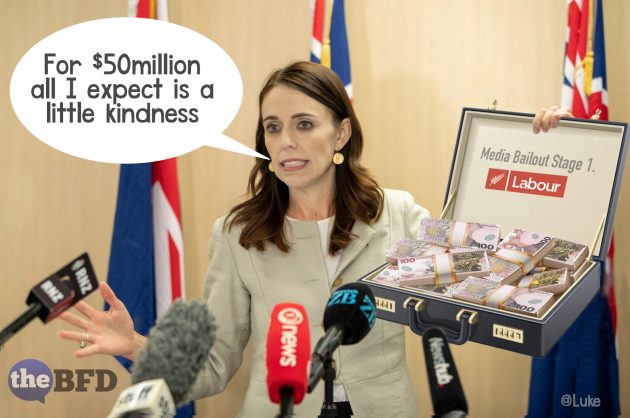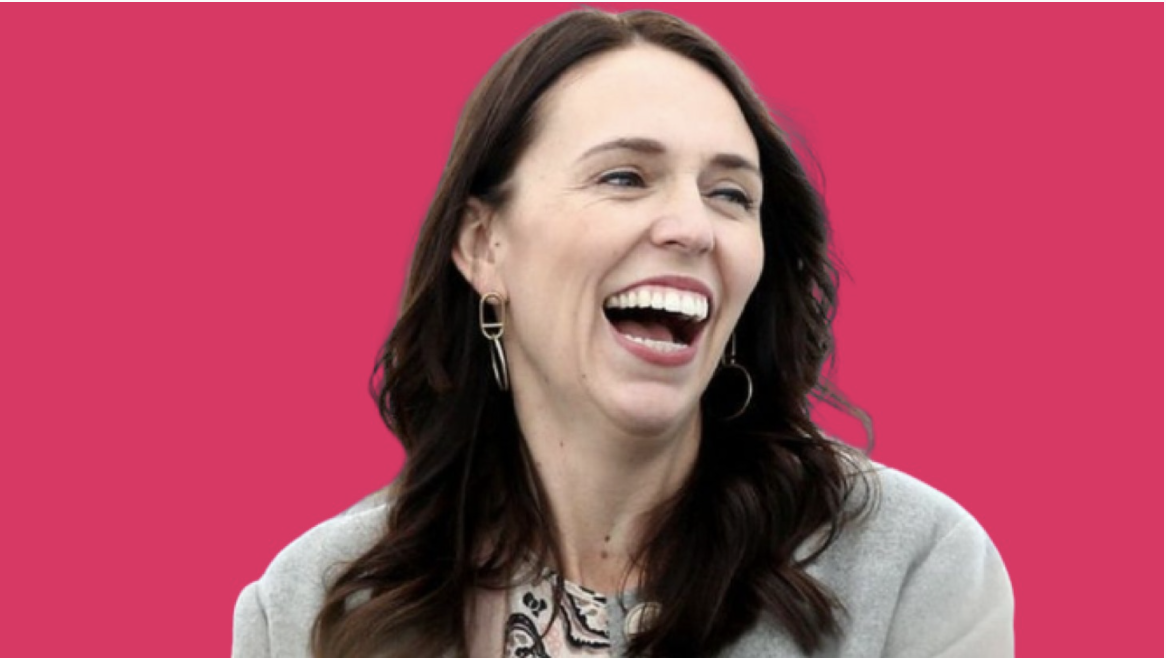Graham Adams
Victoria University of Wellington – Te Herenga Waka
democracyproject.nz
Graham Adams is a journalist, columnist and reviewer who has written for many of the country’s media outlets including Metro, North & South, Noted, The Spinoff and Newsroom
Surprisingly for a Minister of Finance, Grant Robertson is an ebullient, jolly sort of fellow and it is not unusual for him to barrack from his seat next to the Prime Minister in Parliament to support her.
This week, Judith Collins had barely finished putting a question to Jacinda Ardern about media funding when he guffawed derisively.
Collins asked:
“What does she say to people who are concerned that her $55 million Public Interest Journalism Fund — which includes numerous criteria for media to adhere to — is influencing the editorial decisions of media outlets in New Zealand?”
The Prime Minister — perhaps encouraged by her deputy’s derision — rose from her seat to reply. “Mr Speaker,” she declaimed emphatically, “I would abso-loot-ely reject that!”
With Robertson continuing to chortle at the ridiculousness of Collins’ question, Ardern was emboldened. “But, better yet, Mr Speaker,” she said, grinning broadly and stifling a laugh: “I would put the question to the media and ask whether they agree with that sentiment.”
Despite the Prime Minister’s obvious glee and that of her colleagues, this was an exceedingly stupid retort. Presumably, she is not acquainted with Mandy Rice-Davies’ contribution to the Oxford Dictionary of Quotations as a result of the Profumo scandal in 1960s Britain. When legal counsel pointed out that a peer had denied having had an affair with her or even having met her, Rice-Davies uttered the immortal line: “Well he would [say that], wouldn’t he?”
Even Blind Freddie could see that media organisations aren’t exactly going to be impartial witnesses in their own case when they are accused of having been effectively bought by $55 million of government money. Any more, perhaps, than a panel beater is going to be a disinterested designer of an intersection (as David Lange once quipped).
Watching Ardern and Robertson egging each other on as they ambled unaware into dangerous terrain, it was very difficult not to wonder who exactly was going to have the last laugh on the matter.
It turned out to be David Seymour. After Ardern had sat down — looking very pleased with herself — Act’s leader stood. He looked grave as he asked a more specific question:
“What then would happen to a media outlet that received money under the fund and wanted to report a story deemed inconsistent with the principles of the Treaty of Waitangi, which is one of the requirements to adhere to?”
When Ardern got up to reply, the smile had been completely wiped off her face — and Grant Robertson’s too. Both seemed to have just realised where this line of questioning might be leading.
Ardern looked rattled as she replied: “I absolutely reject the idea that there is political influence in broadcasting and media!”
She sat down to Opposition cries of “Answer the question!”
The fact is the issue is not going to go away no matter how much Ardern blusters in Parliament. And, unfortunately for her and the media recipients of government largesse, it is an explosive and corrosive predicament for both.
Most obviously, it is easily painted as the government buying an editorial point of view to suit its purposes – just as Collins and Seymour alleged. This, in turn, immediately raises suspicions about the media’s independence, with all the dismal consequences that entails for the trust their audiences place in them.

As Seymour noted in Parliament, the guidelines that determine eligibility for the millions of dollars on offer make it very explicit what position media must take on the Treaty.
The section describing the fund’s goals recommends “actively promoting the principles of Partnership, Participation and Active Protection under Te Tiriti o Waitangi acknowledging Maori as a Te Tiriti partner“.
And the first of the general eligibility criteria requires all applicants to show a “commitment to Te Tiriti o Waitangi and to Maori as a Te Tiriti partner”.
In short, anyone sceptical of the proposition that the Treaty implies a “partnership” seems very unlikely to get any money. Yet, that question is exactly what is contested by the many critics of Maori-Crown co-governance plans who are alarmed at the prospect of 15 per cent of the population being granted equal say with the other 85 per cent in many spheres of New Zealand life.
Ardern might be keen to distance the government from the fund but that’s not an easy task when it was designed by the Ministry for Culture and Heritage in conjunction with NZ On Air, whose board members are appointed by the Minister of Broadcasting.
And there is a sting yet to come. The contentious report He Puapua that maps out a pathway to 50:50 Maori co-governance recommends a “public education campaign” that includes material on “te Tiriti, the Treaty settlement process… and Treaty partnerships”.
It’s going to be very easy for the Opposition to make a link between He Puapua’s demands for such a campaign and the government’s very specific requirements about how the Treaty is to be approached in order for media organisations to qualify for a lavish handout.
Auckland University’s Dr Elizabeth Rata made it plain this week how central the notion of partnership is to He Puapua. In an essay published by the Democracy Project titled “The Road to He Puapua – Is there really a Treaty partnership?” she wrote:
“He Puapua assumes that the Treaty of Waitangi is a ‘partnership’ between the tribes and the ‘Crown’ — one that entitles the tribes to economic and political rights in perpetuity to the exclusion of all others. This assumption is held to be true, sacred and non-negotiable.”
In an extraordinary move for a democracy, that assumption has now also been established as a “true, sacred and non-negotiable” requirement for any media organisation wanting to dip into the $55 million fund.
The risks to the credibility of news organisations taking part in such a Faustian pact are substantial. On social media, the mainstream media has already been dubbed “the team of 55 million”. It is the sort of catchy description that can easily spread. Similarly, the phrase “Labour’s pay-for-play media bribe” is ripe for repetition.
What Ardern and the media should be worried about beyond having Seymour and Collins on their case is how much mileage Winston Peters will be able to make out of the government’s targeted funding package.
With his longstanding combative — if not contemptuous — stance towards journalists alongside his history of opposing Maori nationalism, Peters will be able to exploit this pact between the government and media to the hilt.
If he does take up the issue, it’s hard to imagine Ardern and Robertson laughing quite so readily or so derisively.
This article can be republished under a Creative Commons CC BY-ND 4.0 license. Attributions should include a link to the Democracy Project.
Please share this article so that others can discover The BFD.

